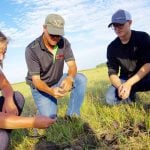A quality beef herd is only as good as its females.
A research project sponsored by the Canadian Hereford Association is designed to discover more about maternal productivity, which includes such qualities as weight gain, milk production, reproductive ability and longevity.
The strength of the Hereford breed is on the maternal side, offering an efficient cow that crosses well. Yet beyond anecdotes, there is little solid information about what makes a good mother cow.
“We really don’t know a lot about what records need to be kept, managed and developed and relayed to the producer,” said Duncan Porteous, general manager of the Hereford Association.
Read Also

Lending policy still focused on primary producers: Farm Credit Canada
Farm Credit Canada said it has not changed its business practices and remains committed to supporting all producers, after a report from an Ottawa-based media outlet claimed otherwise.
The three-year project conducted at Agriculture Canada’s Lethbridge Research Station will use historical data from the Hereford association’s total herd evaluation program which has gathered information on bulls for a number of years.
There are no preconceived ideas of what might be found but the association wants to produce a cow herd productive model.
“It’s an open door. We don’t want to go in with any biases,” he said.
The heritability of maternal traits have been estimated for different breeds but relatively little is known about the genetic relationships among those traits. The association also wants to see how those qualities correlate with growth and carcass traits, said Porteous.
The first year of the study, which started in May, analyzes available data to characterize the Hereford breed for maternal productivity and other economically important traits.
The second year focuses on the traits that directly affect maternal productivity and then develops genetic evaluation procedures for those traits.
The final year focuses on estimating genetic relationships and recommending a breed improvement program for the association.
The project was spurred by the association’s industry advisory group of breeders, cow/calf producers, auctioneers and feedlot operators.
British breeds are regaining prominence for carcass quality and breeders want to be able to back up the claims of productivity and quality.
The research will cost the association $30,000 per year for three years, with matching funds from Alberta Agriculture.















